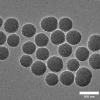News
- Dunphy's research involves studying interactions at the atomic level to design more efficient catalysts for polymer upcycling, an innovative approach for converting plastic wastes into valuable products, such as jet fuels.
 Professor Michael D. McGehee and his team are advancing tandem solar cells—pairing silicon with a high-efficiency material called perovskite—that could significantly improve the economics of renewable energy. While the technology shows great promise, making perovskites durable enough for commercial use remains a key challenge. In October 2025, just as the research was gaining momentum, the Trump administration abruptly terminated the team’s federal grant.
Professor Michael D. McGehee and his team are advancing tandem solar cells—pairing silicon with a high-efficiency material called perovskite—that could significantly improve the economics of renewable energy. While the technology shows great promise, making perovskites durable enough for commercial use remains a key challenge. In October 2025, just as the research was gaining momentum, the Trump administration abruptly terminated the team’s federal grant. Thad Sauvain (ChemEngr’91)recently established a legacy endowment in his estate plan to support undergraduate scholarships for CU Boulder chemical and mechanical engineering majors, with preference for those who demonstrate a commitment to the LGBTQ+ community. Sauvain credits his own time at CU Boulder, where he earned a BS in chemical engineering, with helping him thrive both as an engineer and as a gay individual.
Thad Sauvain (ChemEngr’91)recently established a legacy endowment in his estate plan to support undergraduate scholarships for CU Boulder chemical and mechanical engineering majors, with preference for those who demonstrate a commitment to the LGBTQ+ community. Sauvain credits his own time at CU Boulder, where he earned a BS in chemical engineering, with helping him thrive both as an engineer and as a gay individual. Chemical and biological engineering senior Arianna McCarty has earned the prestigious Churchill Scholarship, becoming just the fourth student in university history to receive the honor. The award will support a year of master’s study at the University of Cambridge, recognizing her exceptional research achievements and academic excellence.
Chemical and biological engineering senior Arianna McCarty has earned the prestigious Churchill Scholarship, becoming just the fourth student in university history to receive the honor. The award will support a year of master’s study at the University of Cambridge, recognizing her exceptional research achievements and academic excellence. Dragan Mejic is the Instrument Shop Supervisor for Chemical and Biological Engineering, whose expert machining, welding and equipment design directly support student learning and cutting-edge faculty research. A trusted, positive presence in the department, he also advocates for state employees through volunteer leadership with the Secure PERA coalition.
Dragan Mejic is the Instrument Shop Supervisor for Chemical and Biological Engineering, whose expert machining, welding and equipment design directly support student learning and cutting-edge faculty research. A trusted, positive presence in the department, he also advocates for state employees through volunteer leadership with the Secure PERA coalition. Assistant Professor Wyatt Shields along with other researchers have developed a safer, targeted way to deliver an ovarian cancer drug using immune cell–carried particles, supported by $300,000 in Gates Institute funding to advance it toward clinical use.
Assistant Professor Wyatt Shields along with other researchers have developed a safer, targeted way to deliver an ovarian cancer drug using immune cell–carried particles, supported by $300,000 in Gates Institute funding to advance it toward clinical use. Meet the department's newest faculty, Assistant Professors Cody Ritt and Antonio Del Rio Flores.
Meet the department's newest faculty, Assistant Professors Cody Ritt and Antonio Del Rio Flores. CU researchers have created shape-shifting microparticles that change their shape in response to environmental factors for self-directed propulsion and navigation.
CU researchers have created shape-shifting microparticles that change their shape in response to environmental factors for self-directed propulsion and navigation. A CU Boulder team has invented a sound-wave technique that softens dense tumors so chemotherapy can penetrate more deeply. The discovery could boost treatment effectiveness and make cancer therapies safer for patients.
A CU Boulder team has invented a sound-wave technique that softens dense tumors so chemotherapy can penetrate more deeply. The discovery could boost treatment effectiveness and make cancer therapies safer for patients. By creating UV-sensitive materials and innovative 3D printing resins, alumnus Alexander Osterbaan (PhD ChemEngr'25) has made it possible to print detailed, high-quality parts more efficiently. His work brings new possibilities to light-based manufacturing.
By creating UV-sensitive materials and innovative 3D printing resins, alumnus Alexander Osterbaan (PhD ChemEngr'25) has made it possible to print detailed, high-quality parts more efficiently. His work brings new possibilities to light-based manufacturing.

